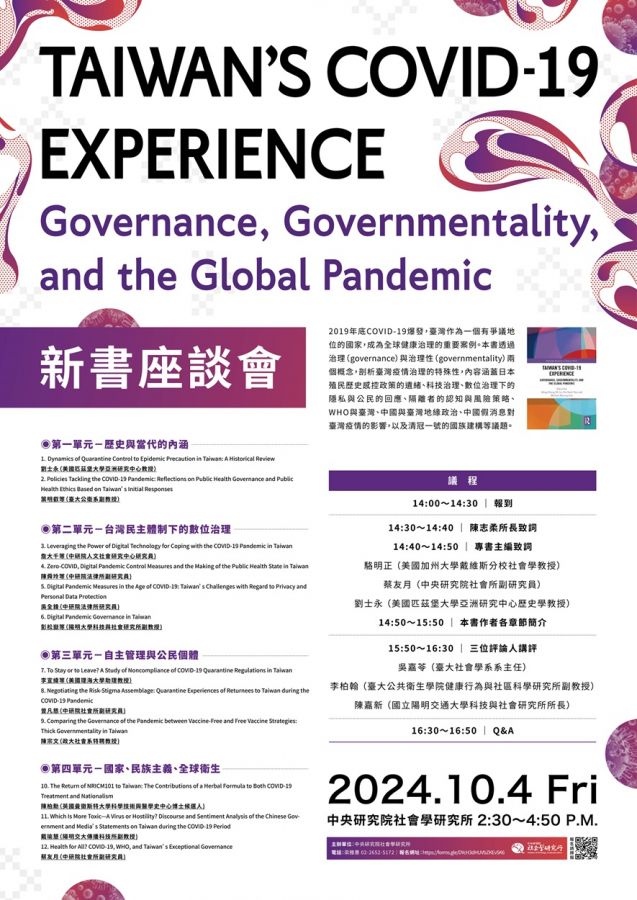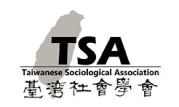中研院社會所10/4"Taiwan’s COVID-19 Experience: Governance, Governmentality, and the Global Pandemic"新書座談會
2024-09-05
中研院社會所即將於10月份舉辦由駱明正、蔡友月及劉士永等主編的Taiwan’s COVID-19 Experience: Governance, Governmentality, and the Global Pandemic新書座談會,歡迎踴躍報名參加!
主 題:Taiwan’s COVID-19 Experience: Governance, Governmentality, and the Global Pandemic(Routledge 2024)新書座談會
主 編:駱明正(美國加州大學戴維斯分校社會學系教授)
蔡友月(中央研究院社會學研究所副研究員)
劉士永(美國匹茲堡大學亞洲研究中心歷史學系教授)
十二篇跨領域作者:劉士永、葉明叡、鄭雅文、詹大千、陳舜玲、黃于玲、吳全鋒、彭松嶽、李宣緯、曾凡慈、陳宗文、陳柏勳、戴瑜慧、蔡友月等
評論人:吳嘉苓(臺大社會學系系主任)
李柏翰(臺大公共衛生學院健康行為與社區科學研究所副教授)
陳嘉新(國立陽明交通大學科技與社會研究所所長)
報名:https://forms.gle/DYcH3dHUVbZKEv5K6
時間:2024年10月4日(五),14:30-16:50
地點:中研院社會所802會議室(中研院人文館南棟8樓)
聯絡人:梁雅惠,as0200802@gate.sinica.edu.tw
【演講簡介】
2019年底COVID-19爆發,臺灣作為一個有爭議性的國家,成為全球健康治理的重要案例。本書透過治理(governance)與(governmentality)兩個概念,剖析臺灣疫情在全球治理下的在地特殊性。本英文專書結合社會學、法律、歷史、STS、公衛與傳播等跨領域學者,共分為四個單元,一、歷史與當代的脈絡;二、台灣民主體制下的疫情治理;三、自主管理與公民;四、國家、民族主義與全球衛生。內容含蓋日本殖民歷史感控政策的遺緒、科技治理、數位治理下的隱私與公民的回應、隔離者的認知與風險策略、WHO與臺灣、中國與台灣地緣政治、中國假消息對臺灣疫情的影響,以及清冠一號的國族建構等議題。
【活動說明】
1.本場次演講,僅規劃現場參與,無線上參與形式。
2.新書連結:https://reurl.cc/YqV3lo
.................................................................................................................
Topic: Taiwan’s COVID-19 Experience: Governance, Governmentality, and the Global Pandemic
Editor-in-chief:
Ming-Cheng M. Lo (Professor, Department of Sociology, University of California, Davis)
Yu-Yueh, Tsai (Associate Research Fellow, Institute of Sociology, Academia Sinica)
Michael Shi-yung Liu (Global Professor, Asian Studies Center, Universality of Pittsburgh)
Ming-Cheng M. Lo (Professor, Department of Sociology, University of California, Davis)
Yu-Yueh, Tsai (Associate Research Fellow, Institute of Sociology, Academia Sinica)
Michael Shi-yung Liu (Global Professor, Asian Studies Center, Universality of Pittsburgh)
Twelve multidisciplinary authors:
Shi-yung Liu, Ming-Jui Yeh, Ya-wen Cheng, Ta-Chien Chan, Shun-Ling Chen, Yu-Ling Huang, Chuan-Feng Wu, Sung-Yueh Perng, Hsuan-Wei Lee, Fan-Tzu Tseng, Tzung-wen Chen, Po-Hsun Chen, Yu-Hui Tai, Yu-Yueh Tsai et al.
Shi-yung Liu, Ming-Jui Yeh, Ya-wen Cheng, Ta-Chien Chan, Shun-Ling Chen, Yu-Ling Huang, Chuan-Feng Wu, Sung-Yueh Perng, Hsuan-Wei Lee, Fan-Tzu Tseng, Tzung-wen Chen, Po-Hsun Chen, Yu-Hui Tai, Yu-Yueh Tsai et al.
Discussants:
Chia-Ling Wu (Department Chair, Department of Sociology, National Taiwan University)
Po-Han Lee (Associate Professor, Institute of Health Behaviors and Community Sciences, National Taiwan University)
Jia-shin Chen (Director, Institute of Science, Technology and Society, National Yang Ming Chiao Tung University)
Chia-Ling Wu (Department Chair, Department of Sociology, National Taiwan University)
Po-Han Lee (Associate Professor, Institute of Health Behaviors and Community Sciences, National Taiwan University)
Jia-shin Chen (Director, Institute of Science, Technology and Society, National Yang Ming Chiao Tung University)
Time: 2024.10.04,14:30-16:50
Registration: https://forms.gle/DYcH3dHUVbZKEv5K6
Venue: 8F, Room802, Institute of Sociology, South Wing, Humanities and Social Sciences Building, Academia Sinica
Contact Person: Ya-hui Liang (as0200802@gate.sinica.edu.tw)
Brief:
At the end of 2019, the outbreak of COVID-19 highlighted Taiwan as a notable case in global health governance, particularly given its controversial political status. This book examines the distinctiveness of Taiwan’s pandemic management through two analytical lenses:
Governance and Governmentality. This book brings together interdisciplinary scholars from sociology, law, history, Science and Technology Studies (STS), public health, and communication studies. It includes four sections: 1. Historical and Contemporary Contexts; 2. Liberal Democracy and Pandemic Management; 3. Self-Governance and Individual Citizens; 4. Nationhood, Nationalism, and Global Health. The discussion encompasses a range of issues, including the historical legacy of Japanese colonial infection control, technological governance, privacy concerns, and citizen responses under digital governance, risk strategies of individuals in quarantine, the World Health Organization (WHO) and Taiwan, the geopolitics between China and Taiwan, the effects of Chinese misinformation on Taiwan, and the role of NRICM101 in constructing national identity and so on.
Note:
1.Online participation is not available.
2.Book Link: https://reurl.cc/YqV3lo

Registration: https://forms.gle/DYcH3dHUVbZKEv5K6
Venue: 8F, Room802, Institute of Sociology, South Wing, Humanities and Social Sciences Building, Academia Sinica
Contact Person: Ya-hui Liang (as0200802@gate.sinica.edu.tw)
Brief:
At the end of 2019, the outbreak of COVID-19 highlighted Taiwan as a notable case in global health governance, particularly given its controversial political status. This book examines the distinctiveness of Taiwan’s pandemic management through two analytical lenses:
Governance and Governmentality. This book brings together interdisciplinary scholars from sociology, law, history, Science and Technology Studies (STS), public health, and communication studies. It includes four sections: 1. Historical and Contemporary Contexts; 2. Liberal Democracy and Pandemic Management; 3. Self-Governance and Individual Citizens; 4. Nationhood, Nationalism, and Global Health. The discussion encompasses a range of issues, including the historical legacy of Japanese colonial infection control, technological governance, privacy concerns, and citizen responses under digital governance, risk strategies of individuals in quarantine, the World Health Organization (WHO) and Taiwan, the geopolitics between China and Taiwan, the effects of Chinese misinformation on Taiwan, and the role of NRICM101 in constructing national identity and so on.
Note:
1.Online participation is not available.
2.Book Link: https://reurl.cc/YqV3lo




